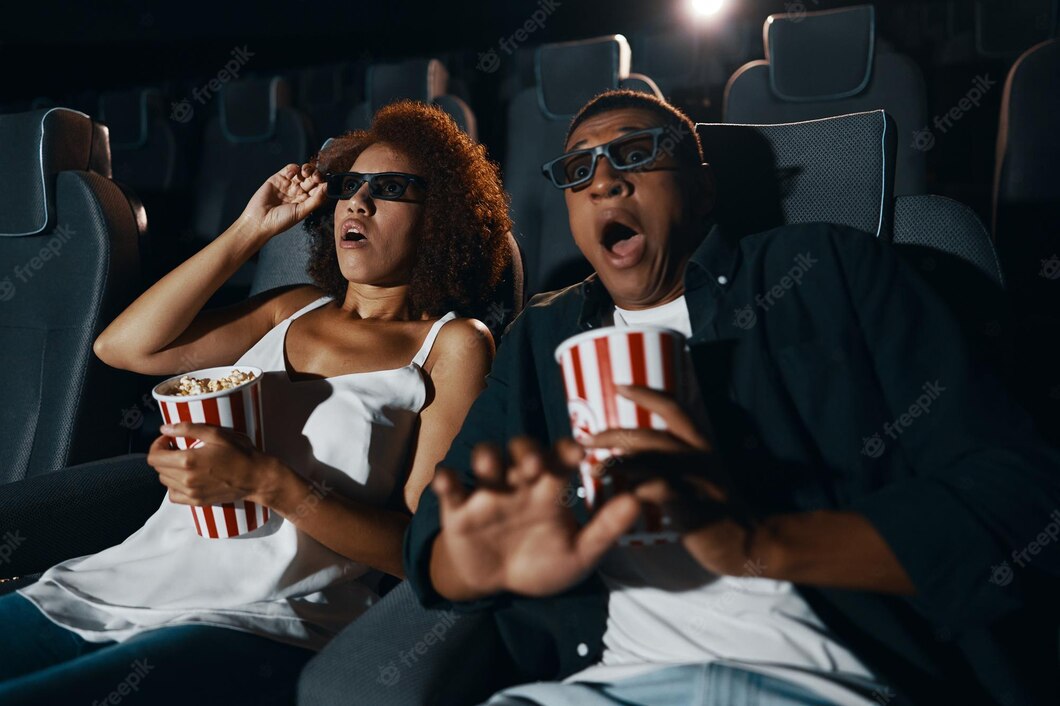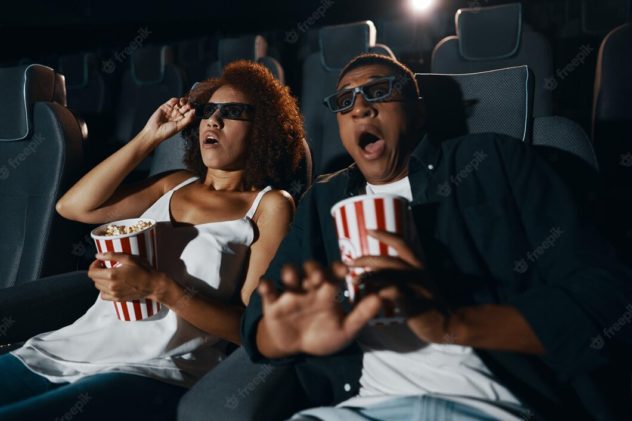Horror movies have maintained a strong appeal among cinema enthusiasts, offering a distinctive concoction of suspense, excitement, and fear that captivates audiences. But what drives our enjoyment of being scared?
This article delves into the reasons behind people’s fascination with horror movies, exploring when they are most enjoyed and who tends to be drawn to the spine-chilling experiences they offer.
Join the PERA (Personal Entertainment Research Assistant) waitlist.
The World's Most Indispensable Movie App
The RunPee app tells you the best times to
run & pee during a movie
so you don't miss the best scenes.
Download the RunPee app.
100% free (donation supported)
What Motivates the Viewing of Horror Films?
Despite the unsettling emotions they provoke, horror movies appeal to millions of viewers. Let’s observe some of the critical mental factors contributing to this fascination.
What people are saying
about the RunPee app.
Movie Watching Must Have!!
I go feral for this app. I love it so much and I wish everyone knew about it and used it. It is incredibly useful and I would be devastated if this app ever disappeared. Things I love: 1) the pee times! It’s so handy to know the best time to go and then read the synopsis of what’s happening while I’m gone. I never have to worry about missing the good bits! 2) knowing if there is a post-credits scene or not. This might be my fav feature because I would have missed out on some pretty critical scenes if it weren’t for RunPee. 3) the movie review and viewer rankings. This info has made me watch some movies that I normally wouldn’t and it’s nice seeing things outside of my usual scope. 4) that it’s a small family run business. I love shopping small and it really does feel like I’m part of the RunPee family! If you reach out to them, Dan will personally respond to you and he is so warm and helpful. GET THIS APP AND THEN SUBSCRIBE! It is absolutely worth it and you’ll be using it again and again!
View all reviews
Apple App Store | Google Play Store
Download RunPee app
The Excitation Transfer Phenomenon
Glenn Sparks suggests that one explanation for the appeal of horror films lies in the post-viewing experience.
Research conducted by Sparks indicates that when watching frightening movies, individuals experience an increase in heart rate, blood pressure, and respiration. This heightened physiological arousal persists even after the film concludes.
Consequently, any tremendous emotions ultimately felt are amplified. Instead of living on the fear experienced throughout the film, viewers recall the enjoyment and pleasure, prompting a choice for additional engagement. Similar to what has been shown in online gaming, a small win can evoke amplified incredible sensations because of the lingering arousal, fostering a choice for persistent participation to copy that thrill.
Catharsis
This concept is rooted in Greek philosophy and embodies a profound emotional release. Aristotle proposed that people are interested in scary narratives and severe theatrical productions because they offer an outlet for purging poor emotions.
Consequently, consistent with his perspective, attraction to horror films and dramatic plays serves as a means of venting pent-up aggression.
Psychoanalytic concept by Freud and Jung
According to Freudian psychoanalysis, horror is an expression of the “uncanny,” which stands for repressed feelings and ideas that the ego has pushed aside but which yet retain a vague familiarity for the individual.
On the other hand, Jungian philosophy suggests that the appeal of horror comes from delving into basic archetypes or primordial images found in the collective unconscious.
Disposition Alignment
The idea of dispositional alignment shows that people derive joy from the violence depicted in horror films when it targets characters they deem deserving of such treatment. This concept posits that emotional responses to those cinematic activities stem from pre-present feelings toward the characters involved.
When Can We Enjoy Horror Movies Most?
Achieving the most appropriate enjoyment from horror films is intricately tied to preserving a mental “protecting frame,” which encompasses three excellent but interrelated classes:
The safety frame revolves around the essential need to experience physical stability. Despite the spine-chilling events unfolding on the display screen, people can derive pride from the experience as long as they believe that the evil forces depicted are bodily distant and, therefore, incapable of causing harm to them. This psychological guarantee serves as a buffer, allowing viewers to immerse themselves in scary situations without succumbing to overwhelming fear.
Detachment Frame performs a vital role in enhancing the amusement of horror films. This entails mentally distancing oneself from the terrifying activities unfolding before one’s eyes. For example, while faced with scenes of characters being pursued by a serial killer, viewers can prompt a sense of psychological detachment by reminding themselves of the fictitious nature of the narrative and the scripted performances of the actors concerned.
By acknowledging the artificiality of horror, individuals can correctly tame their emotional reactions, allowing them to respect their joys without being eaten up by worry.
The control frame symbolizes the importance of having a sense of power and authority over imagined threats. This aspect hinges on individuals’ confidence in their ability to navigate and overcome the threats on the screen.
Whether identifying with the resilient protagonists or envisioning strategies to outsmart the opposed forces, the ability to exercise some degree of control over the events taking place can enhance the pleasures of watching. This empowerment increases the excitement that comes from facing the unknown and intensifies interaction with the story.
Who Finds Pleasure in Horror Movies?
Not everyone is a fan of horror movies. Psychological studies have explored the subtle ways in which character differences can influence a person’s attachment to these movies.
High Sensation Seekers
Individuals with an excessive sensation-seeking persona tend to gravitate closer to horror films. These thrill-seekers actively seek novel, volatile, or extreme experiences and derive excitement from them, even if those experiences involve negativity or worry-inducing scenarios.
People with Lower Empathy Levels
There exists a correlation between decreased tiers of empathy and a heightened amusement of horror movies. Those with reduced empathy may find it less complicated to detach themselves from the struggle depicted on screen, permitting them to revel in the suspense and terror without being emotionally overwhelmed.
However, a few researchers oppose this notion, arguing that the empathy we extend towards fictional characters might not immediately translate to empathy in actual-lifestyles eventualities.
Age and Gender
Age and gender play extensive roles in shaping possibilities within the horror style. Typically, more youthful individuals exhibit a more potent appeal to horror movies, perhaps because of a greater inclination toward searching out new reviews and sensations.
Additionally, gender differences emerge in choices: ladies might lean toward horror movies with uplifting conclusions or nuanced man or woman improvement. In contrast, men might prefer those encumbered with extreme, adrenaline-pumping sequences.
Understanding the psychological foundation of horror consumption can deepen one’s appreciation for the genre. Far from mere entertainment, horror films offer a multifaceted experience that encompasses thrill, catharsis, and exploration of the human psyche’s darker corners. They provide a platform for confronting fears in a managed environment and grappling with the complexities of human nature.






